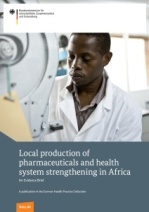Local production of pharmaceuticals and health system strengthening in Africa
An Evidence Brief
Writer:
Maureen Mackintosh, Julius Mugwagwa, Geoffrey Banda and Jires Tunguhole
Published by Federal Ministry for Economic Cooperation and Development (BMZ), Division for health, population and social protection, July 2017

Key Learnings
Industrial development in pharmaceuticals in Africa can support health system strengthening
Developing local pharmaceutical production can improve access to medicines and help to generate the scientific, technological and skills base for building stronger and more resilient health systems. These health-industry mutual benefits also depend on funding and managing competent, inclusive, population-focused health services, and on effective industrial regulation for quality assurance.
Local and global perspectives on emergency preparedness differ: both must be addressed
Global health security frameworks focus on technologies for emergencies that threaten the wider world. African experts shift the focus onto breaking supply constraints for recurrent lethal emergencies by building local supply capacities and organisational expertise. Both contributions are needed to build medium-term health security.
External actors can support an upward spiral of health-industry synergies
An upward spiral of industrial development and health system strengthening is emerging in some countries. External actors can support these synergies by linking up initiatives to strengthen access to medicines, through funding and procurement, to initiatives to strengthen the local industrial supplier base.
Context
Low-income populations in sub-Saharan Africa (SSA) continue to suffer inadequate health care, undermined by poor access to medicines. In the context of Sustainable Development Goal (SDG) 3 and international commitments to universal health coverage (UHC), international intervention finances large-scale international procurement of medicines and supports health system strengthening. Meanwhile, pharmaceutical manufacturing in SSA is long established, and is currently being promoted by African governments and other actors including the African Union Commission (AUC), the New Partnership for Africa’s Development (NEPAD) and the East African Community (EAC), and supported also by external actors including Germany’s Federal Ministry for Economic Cooperation and Development (BMZ). This Brief presents evidence for the actual and potential health and development benefits from creating stronger local and global linkages between these industrial and health agendas, and outlines how this can be done.
The scope for local upward spirals: ‘win-wins’ for health and industrial development
Industrial development in pharmaceuticals is currently observed to be interacting in a number of African countries with rising commitment to local funding of health supplies and to health system strengthening, in a virtuous upward spiral. Once underway, a mutual benefit lobby can emerge between local health system actors anxious to reduce supply shortages and arguing for higher public funding, and local industrialists looking for larger markets. A ‘local health’ policy perspective identifies local health priorities and existing industrial capabilities, and then builds synergies and on-the-ground linkages between industrial and health system investments. In this way, local industrial development in pharmaceuticals can support health system strengthening through:
- increased national government commitment to funding of medicines from domestic taxes, improving medicines access;
- improved pharmaceutical skills and training benefitting health system management and procurement as well as industrial development;
- public and non-profit procurement becoming more responsive to local needs, by building linkages to close-to-market suppliers;
- improved rural access to medicines, as local firms respond to incentives to expand domestic distribution networks;
- falling costs and prices as domestic industrial investment and market competition increase;
- shortened supply chains and hence faster response to emergency supply shortages; and
- reduced incidence of sub-standard medicines, as proximity improves regulatory oversight and the share of public and non-profit procurement rises.
Many of these benefits are medium term: they require patience and commitment to build local health-industry linkages within markets and policy. This medium-term vision is also driving African commitments to building local scientific and technological capabilities for production of vaccines and more complex treatments.
How external actors can support the mutual health-industry benefits
External actors such as BMZ, who both work on health system strengthening and also support industrial development, are well placed to link up these policy ‘silos’. Key areas where policies can have major mutual health-industry benefits include: regulatory strengthening and harmonisation; technological upgrading and improved quality assurance in local manufacturers; investment in skills and training in clinical and industrial aspects of pharmaceuticals at all levels; and strengthening local procurement by international and local agencies through improved local health-industrial collaboration and market linkages. In working for mutual health and industrial improvement, an open-minded, project-based and problem-solving approach can extract early mutual benefits and generate moves towards policy coherence over time.
Industrial development is a social determinant of health
Public health has enlarged its vision recently to include many intersectoral social determinants of population health. However, the impact of industrial development on health is still generally overlooked. Building more robust African health systems requires – and will effectively employ – the scientific and technological capabilities and skills generated by industrial development in pharmaceuticals. As African governments develop their commitment to industrialisation, the global health community has much to contribute in supporting local health systems to extract the maximum benefits for public health.
